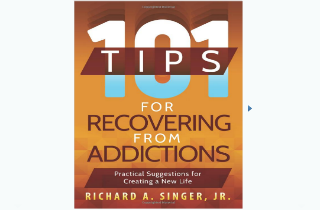What’s This Book About?
The book “101 Tips for Recovering from Addictions – Practical Suggestions for Creating a New Life” by author Richard A. Singer, Jr. is a compilation of useful tips that can be used by anyone who:
- Wishes to begin their road to recovery.
- Wants to keep progressing in their recovery, or …
- Wants to help someone else in the process.
The 101 tips that you will find in this guide for recovery have been used and tested by the author throughout years of successful recovery, relapse, and getting back into recovery again. Many of them also have research backing them and have been used in therapy by counselors and their patients.
But, what does “101 Tips for Recovering from Addictions” really cover? Who is it aimed to help? We review the book here and invite your questions and feedback in the comments section at the end of the page. We do our best to respond with personal and prompt answers to all legitimate inquiries.
3 Take Home Lessons
Although it was difficult to decide on just three take home tips from all 101, we’ve selected and curated the following take-home lessons for you.
TIP #1 Never, Never, Never Give Up
The recovery journey goes through the same ups and downs that normal life does. You cannot expect that there will be only good days. Instead, you can expect there to be challenges, obstacles, discomfort, and heartache…but regardless of what is going on you need to keep doing whatever it takes to move forward in addiction recovery.
REMEMBER THIS: Although life is never one hundred percent fair, living in recovery will never be as bad as being imprisoned in your addiction. So, keep working to better yourself. At the end, no temporary moments of pain, stress, and craving is worth losing your new-found freedom from addiction.
TIP #2 Journaling from the Soul
Journaling is an ancient tradition, one that dates back to at least 10th century Japan. In addition, it has been thoroughly researched and proven to be an effective practice for self-growth and transformation…and it is a great strategy for emotional healing in recovery.
Writing down your thoughts, feelings, and behaviors each day is an excellent strategy for monitoring your progress, searching deep within yourself, and staying out of our heads. The author says, from his personal experience with journaling, that he found it to be so effective in early recovery that he started to write a daily mediation book with journaling sections. He also suggests that you at least try it for a short period of time.
You learn more about expressive writing in recovery here.
TIP #3 Relapse is not a Requirement
Although relapse is cited as a normal part of the addiction and recovery cycle, it is not mandatory. The author suggests you learn all you can about relapse prevention, should it occur. In addition, he talks about relapse as a learning opportunity and advises anyone who goes back on the recovery track after experiencing a relapse to learn from it.
The scary truth is that relapse can be a deadly experience for many addicted to psychoactive substances. So, it is always better to work on staying in recovery…although most people will not experience only one attempt at achieving and maintaining recovery.
Who Is This Book For?
You are probably wondering whether this book is fit for your or a loved one’s situation. After all, you’d benefit from reading books that apply to your individual case.
The author says that the tips in this book are universal and not limited to one type of addiction. Instead it can be used by people suffering from:
- drug addiction
- alcoholism
- sex addiction
- gambling addiction
- love addiction
- food addiction
…and more.
Why Read It?
This book is pack full with great ideas for recovery! You can pick it up as needed. Plus, it is non-linear. No need to read from front to back.It also makes a good gift for a loved one in recovery. But, most of all, the book offers you comfort. You are encourage to continue living without the influence of substances…which is always a good thing!
As the author of this books foreword, Michael Donahue, notes…
”It is our hope that everyone reading this book will learn the following truths:
- There is hope, faith and love for all who believe.
- The hope you regain will lead you to forgiveness for yourself and others.
- You will understand your unique plan and you will be free from guilt.
- Faith is the foundation that you can build a life upon.
- You can trust and believe in a power greater than yourself, in other humans, and in yourself.
- The love you feel is real and unconditional.
- You are loved and you can love and help others.
- We gain love by giving ourselves to others.
- We show love by giving of our time and talents.
- Give until you think you can’t give anymore, then keep giving.
Plus, the book comes in a compact paperback edition, or you can get it in a Kindle edition…so you can take the helpful strategies and coping skills everywhere with you.
Got Any Questions?
You can get “101 Tips for Recovering from Addictions – Practical Suggestions for Creating a New Life” on Amazon for yourself or for someone close to you who is in recovery.
If you have any questions or concerns, please let us know in the designated section below. We value your feedback and do our best to respond personally and promptly to all legitimate inquiries.









Related Posts